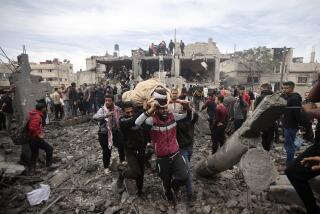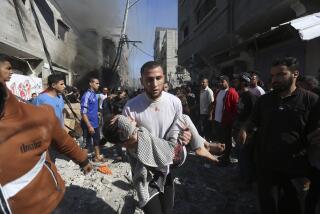Bosnia Serbs Demand Fuel as Peacekeepers’ Toll : Balkans: A letter from the squeezed rebels warns that to pass checkpoints will require supplying gasoline. The U.N. mission says it won’t comply.
- Share via
SARAJEVO, Bosnia-Herzegovina — Hampered by a blockade imposed by their allies in the rump Yugoslavia, Bosnian Serb forces Wednesday turned to the U.N. Protection Force with a demand for fuel to run their sputtering war machine.
A letter delivered from Bosnian Serb headquarters in nearby Pale to the U.N. command center here put peacekeepers on notice that they would be barred from traveling through Bosnian Serb-held territory unless they supplied rebels with gasoline at each armed checkpoint, said U.N. spokesman Maj. Rob Annink.
“This is blackmail, and we will not comply,” Annink said of the demand issued by the increasingly isolated, desperate regime of Bosnian Serb leader Radovan Karadzic.
The rebel threat to block all U.N. movements through Bosnian Serb-held territory that surrounds most peacekeeping bases could grind the U.N. mission to a halt, preventing the 20,000 foreign troops in Bosnia-Herzegovina from carrying out their tasks of escorting humanitarian aid to civilian war victims and providing a modicum of protection to besieged U.N. “safe havens.”
Bosnian Serbs loyal to Karadzic have been feeling the pinch of a fuel shortage since their supply line was shut down two weeks ago by their longtime patrons in the Serbian capital, Belgrade, who have been angered by the rebels’ rejection of an international peace plan.
Bosnian Serbs grow enough food and get sufficient humanitarian aid to feed themselves. But they have been dependent on Serbian President Slobodan Milosevic for spare parts and fuel to run the tanks, armored vehicles and other war machinery that he and his regime inherited from the former Yugoslav National Army and passed on.
Milosevic, chief architect of the Balkan conflict, appears to have cut off his Bosnian proxies to pressure them into signing the peace plan, as well as to undermine Karadzic, who has become an unreliable surrogate, as Bosnian Serbs increasingly assert their independence.
But Karadzic, backed by ardent nationalists committed to Milosevic’s original goal of uniting all Balkan Serbs in an expanded Greater Serbia, has refused to give up any of the seized territory in exchange for peace.
U.N. officials concede that the rebels have been violating U.N.-proclaimed weapons exclusion zones around Sarajevo and the eastern Bosnian Muslim enclave of Gorazde with impunity, and even an anti-sniping accord concluded last weekend has been largely ignored.
“I do not deny that sniping has continued,” Annink said of the hail of bullets that peppered a high-rise apartment building and the Holiday Inn hotel on the government side of the front line Tuesday evening.
Following standard U.N. policy of emphasizing positives in a mission gone badly wrong, Annink noted that the number of cease-fire violations in this battered capital had “dropped dramatically” to 460 Tuesday from the previous day’s 684.
The catch-all term of cease-fire violation now encompasses an array of actions ranging from hijacking heavy weapons from U.N. impoundment sites to firing rocket-propelled grenades with more destructive power than some of the artillery shells banned by a North Atlantic Treaty Organization ultimatum in February.
Rather than knuckling under to pressure from Belgrade to sign the peace plan, the rebels have become emboldened by the U.N. mission’s hesitant response to their belligerence--culminating in the fuel extortion attempt, which effectively holds hostage the entire U.N. peacekeeping force here.
While U.N. officials insisted the mission had no intention of complying, they replied by reiterating their frequent threat: “The code word for our mission in Bosnia-Herzegovina is freedom of movement. If they deny us this, they are saying, ‘We don’t need you, we don’t want you here,’ ” Annink said of the Serbs’ demand for gasoline. “If they do this, we will have to reconsider our mission.”
France and Britain, which contribute the largest peacekeeping contingents in Bosnia, have announced that they will withdraw their forces if the United States follows through on plans to exempt the Muslim-led Bosnian government from a U.N. arms embargo imposed on all of the former Yugoslav federation in 1991.
Both European powers fear that their peacekeepers would become targets of retaliation by the Bosnian Serbs, who would see the lifting of the arms embargo currently shackling their enemies as a form of Western intervention against them.
President Clinton warned last week that he will push to get the embargo lifted after Oct. 15 if the Bosnian Serbs still have not agreed to the peace plan drafted by diplomats from the United States, Russia, Britain, France and Germany.
The Karadzic leadership has already rejected the proposal three times and plans to put it to a popular vote on Aug. 27 and 28.
Meantime, the Vatican on Wednesday set Sept. 8 as the provisional date for a one-day visit to Sarajevo by Pope John Paul II, the Reuters news agency reported.
More to Read
Sign up for Essential California
The most important California stories and recommendations in your inbox every morning.
You may occasionally receive promotional content from the Los Angeles Times.











